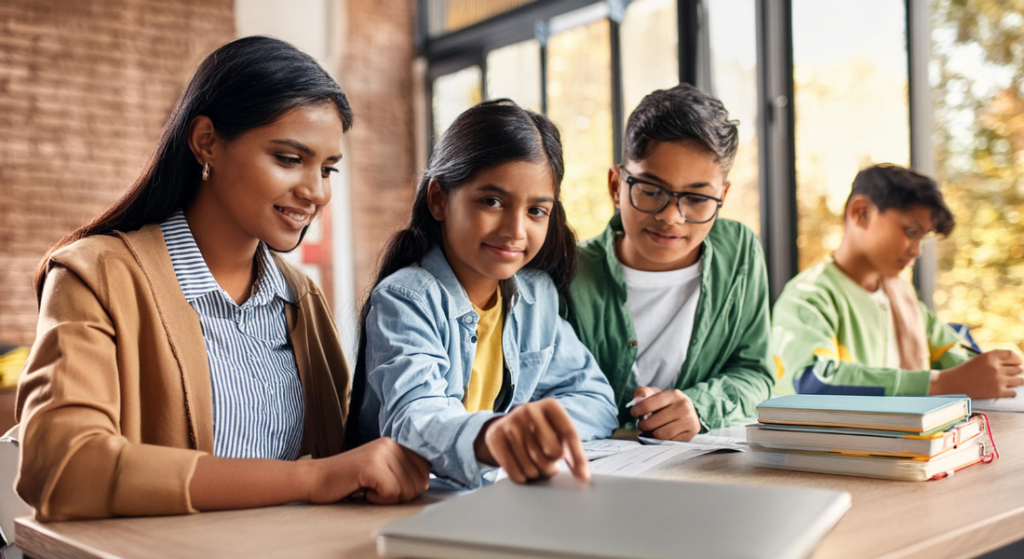Introduction:
Education is the foundation for personal growth, professional success, and societal progress. It empowers individuals to develop critical thinking skills, expand their horizons, and unlock their full potential.
The Foundations of Learning:

- Literacy
Mastering reading, writing, and communication skills
- Numeracy
Developing proficiency in mathematics and quantitative reasoning
- Critical Thinking
Cultivating the ability to analyze, evaluate, and solve problems
Education begins with establishing a strong foundation in the core disciplines of literacy and numeracy. These fundamental skills empower learners to effectively communicate, understand the world around them, and develop critical thinking abilities. Through this solid groundwork, students can progress to more advanced conceptual and analytical competencies.
Developing Critical Thinking Skills:
- Analysis
Examining information from multiple perspectives
- Evaluation
Assessing the validity and reliability of data
- Problem-Solving
Devising innovative solutions to complex challenges
To successfully navigate the complexity of the modern world, critical thinking is necessary.. Education fosters the ability to analyze information objectively, evaluate evidence and arguments, and devise creative solutions to problems. These foundational skills empower learners to make informed decisions, adapt to change, and become independent, lifelong thinkers.
Expanding Horizons through Education:

- Global Perspectives
Education exposes students to diverse cultures, customs, and worldviews, broadening their understanding of the human experience.
- Interdisciplinary Learning
By exploring connections between different fields of study, students develop a more comprehensive and integrated understanding of complex issues.
- Lifelong Curiosity
Education fosters a love of learning, encouraging students to continuously seek new knowledge and explore uncharted territories.
Empowering Individuals and Communities:
- Personal Empowerment
Education equips individuals with the knowledge, skills, and confidence to take control of their lives and reach their full potential.
- Community Transformation
When individuals gain access to quality education, they can contribute to the betterment of their communities, fostering positive change.
- Social Mobility
Education opens up opportunities for upward mobility, enabling individuals to break cycles of poverty and inequality.
Preparing for the Workforce:
- Job-Readiness Skills
Education equips students with essential skills like communication, teamwork, and problem-solving, preparing them for success in the workplace.
- Practical Experience
Internships, apprenticeships, and hands-on projects allow students to gain real-world experience and apply their knowledge in professional settings.
- Lifelong Learning
The workforce is constantly evolving, and education fosters a mindset of continuous learning and adaptation to meet the demands of the future.
Fostering Personal Growth and Fulfillment:

- Self-Discovery
Explore interests, talents, and passions
- Confidence Building
Develop self-belief and overcome challenges
- Lifelong Learning
Cultivate a mindset of continuous growth
- Meaningful Contribution
Find purpose and make a positive impact
Education empowers individuals to embark on a journey of self-discovery, uncovering their unique talents and passions. By building confidence and resilience, learners can overcome obstacles and pursue their aspirations. Education fosters a lifelong love of learning, inspiring individuals to continuously expand their knowledge and skills. Ultimately, this journey leads to a sense of purpose and the ability to make meaningful contributions to their communities.
Promoting Social Mobility and Equity:
- Access to Quality Education
Ensuring equal opportunities for all individuals, regardless of socioeconomic background
- Removing Barriers
Addressing systemic inequalities and providing support for underprivileged communities
- Empowering Marginalized Groups
Empowering traditionally underrepresented populations to reach their full potential
Education plays a crucial role in promoting social mobility and equity by providing equal access to opportunities for all individuals. By addressing systemic barriers and empowering marginalized communities, education can be a powerful tool for breaking the cycle of poverty and inequality, enabling individuals to rise above their circumstances and achieve their aspirations.
The Role of Technology in Education:

- Enhancing Learning Experiences
Technology has transformed education by enabling interactive, multimedia-rich learning experiences that captivate students and deepen their engagement with course material.
- Empowering Educators
Digital tools and resources give teachers new ways to present information, assess student progress, and personalize instruction to meet the unique needs of each learner.
- Expanding Access to Knowledge
Online courses, artificial Intelligence, digital libraries, and educational platforms provide learners around the world with unprecedented access to a vast wealth of information and educational opportunities.
Conclusion: The Lifelong Impact of Education:
Education is a transformative journey that leaves an indelible mark on individuals, communities, and societies. By fostering critical thinking, expanding horizons, and empowering personal growth, education equips learners with the tools to navigate life’s challenges and reach their full potential.
Also read this: Indian Institute of Remote Sensing
